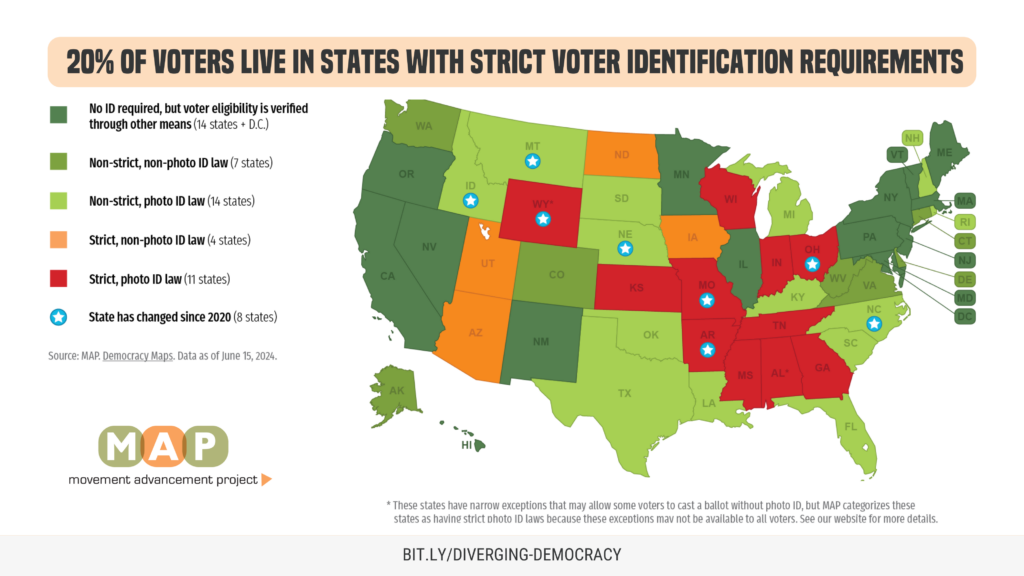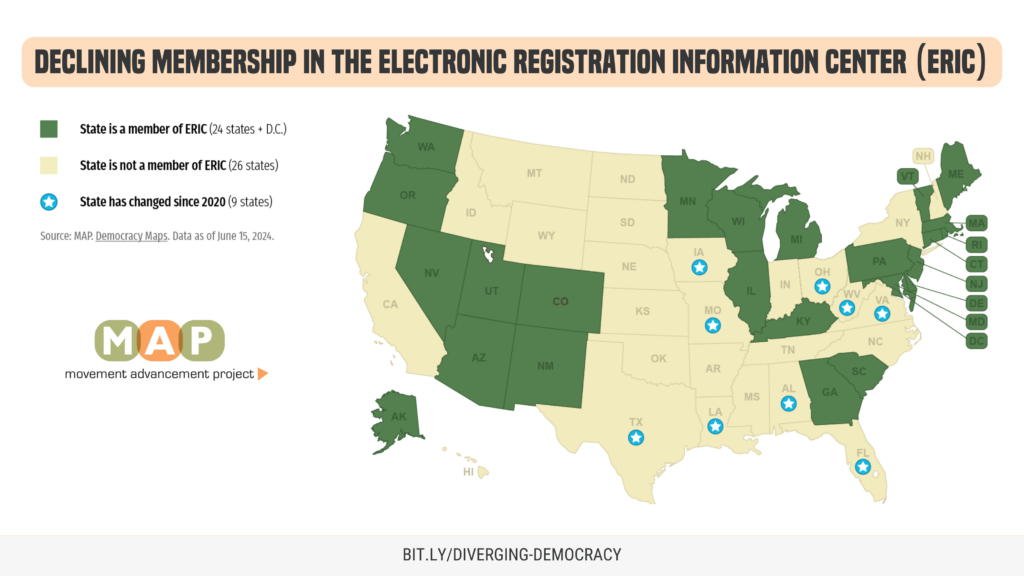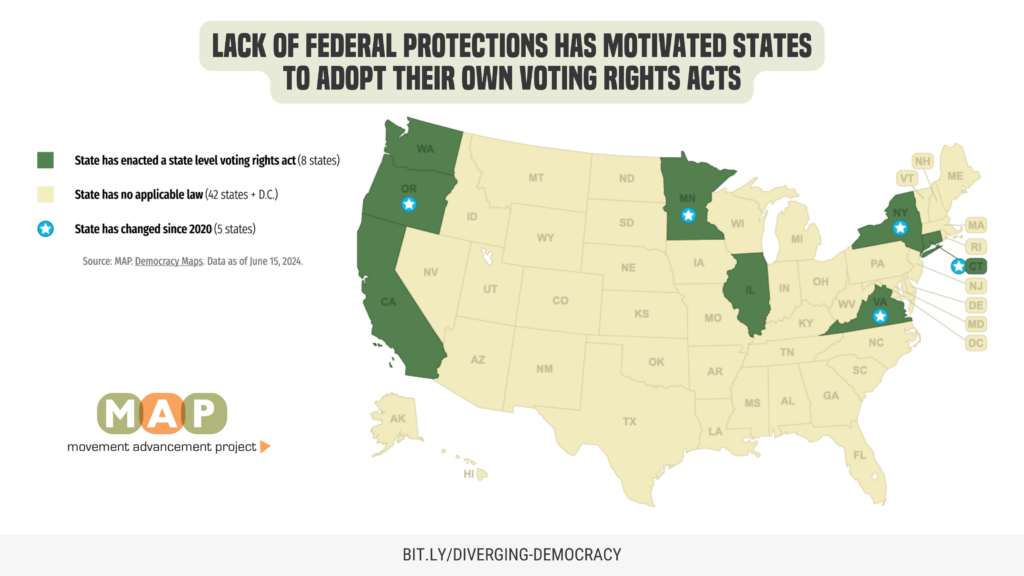Data: Recent Anti-Voter Laws Have Made It Harder to Vote Since 2020
Despite the challenges set by a global pandemic and a grave rise in voter intimidation, the 2020 election had one of the highest voter turnouts in over a century. That may not be the case in 2024 due to the number of states that have made it harder to voter in the past four years, thanks to a rise in anti-voting policies.
A new report released today by the Movement Advancement Project (MAP) — an independent nonprofit think tank that promotes civic equality — sheds light on the number of pro-voting and anti-voting policies passed throughout the country, compiling data to explain exactly how it’s become harder to vote in almost half of the states in the country.
According to the report, 18 states have expanded voter access since 2020 by passing pro-voting policies like increasing penalties for election intimidation and threats, banning guns near polling places, implementing automatic voter registration and passing a state-level Voting Rights Act.
Meanwhile, 24 states have enacted restrictive voting policies since 2020, which include laws that add strict voter ID requirements; withdraw membership from the Electronic Registration Information Center (ERIC); give state legislatures more power to interfere in election administration; and ban private funding for election offices. Cumulatively, this translates to only 36% of eligible voters living in states that have enacted at least one expansive voting law, the report found.
“I think it’s evident that the polarization and the divergence that’s shown in the report has the potential to sow confusion among voters, and even lead to potential disenfranchisement when you talk about things like strict voter ID laws,” Brian Hinkle, a Senior Voting Policy Researcher at MAP who was a lead author of the report, told Democracy Docket in an interview. “And that’s particularly true for marginalized groups that already face great barriers to the ballot box.”
Over the past four years, at least eight states — Arkansas, Idaho, Missouri, Montana, Nebraska, North Carolina, Ohio and Wyoming — have passed laws to require a form of ID to vote, according to the report. That translates to one in four eligible voters living in a state with ID requirements — which is poised to affect millions of voters in the 2024 election. New Hampshire became the latest state to advance a strict voter ID law, which the Republican-controlled Legislature passed in May and awaits Gov. Chris Sununu’s (R) signature. Hinkle said the change will “have a big impact” on voters, and “voters of color in particular.”

The report also points to the number of states who have left ERIC, a nonprofit organization and database that helps states share resources and information to maintain accurate voter rolls, as a major reason why voting is more restrictive this election cycle. According to the report, with just 24 states and the District of Columbia still members of ERIC, that translates to just 40% of eligible voters whose registration is accurately tracked throughout the system.
“I’ve been doing this work for a while and that used to be a relatively non-controversial topic. It was talked about by subject matter experts,” Hinkle said. “But with the advent of the election denial movement and misinformation and disinformation, all of a sudden, the states just started leaving this organization, which is really recognized as one of the best tools to maintain accurate voter lists. I think that has somewhat of an underrecognized effect. If states aren’t maintaining voter rolls well, and a voter shows up to the polling place and there’s an error — they were left off or something like that — that can lead to potential problems casting a ballot.”

The report explains that the cascade of anti-voting laws over the past four years disproportionately affects Black voters and voters in the South and Midwest. According to the data, at least 65% of Black adults now live in a state that has passed at least one restrictive voting law. In total, 57% of eligible voters are living in a state with more restrictions on voting.
The report isn’t all doom and gloom. At least 18 states have become more expansive for voter access since 2020, passing a number of laws to expand voter access and protect election workers and voters from the growing threat from the election denial movement. A major positive trend that the report highlights is the number of states who’ve passed their own state-level Voting Rights Act (VRA) in the wake of the U.S. Supreme Court’s 2015 decision in Shelby County v. Holder, which essentially gutted key provisions of the federal VRA. In the past four years Connecticut, Minnesota, New York, Oregon and Virginia have passed their own VRA that add a number of essential protections to voters, like granting them legal tools to fight voter suppression in the courts.
But with only five states that have passed a VRA, a majority of voters don’t have such protections — one in five eligible voters, according to the report. “I think with the relative lack of federal protections right now, and the unfortunate lack of momentum on passing Federal Voting rights legislation, these state level protections are very important,” Hinkle said. “And I think that’s an expansive trend I’d like to see continue.”

Read the report here.
This post was updated on Tuesday, June 18 at 1:00 p.m. EDT to reflect that the New Hampshire voter ID law passed the state Legislature but has yet to be signed into law.